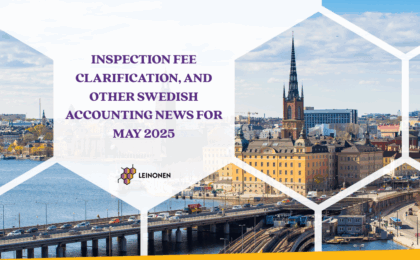Earlier this year, businesses in Sweden were impacted by significant changes to K2 and K3 regulations, and clarifications were made regarding the taxation of employee discounts. Since then, the Swedish Tax Agency has released a number of further clarifications, statistics, and position statements affecting both local and foreign-owned businesses in Sweden.
In this article, we have compiled some of the most important Swedish accounting news you need to know this autumn. For tailored support staying up to date on the latest regulations that may impact your foreign-owned business in Sweden, connect with a Leinonen expert today.
Key Swedish Accounting News for Autumn 2025
Conditions for Deducting Input tax on Employee Expenses Clarified
The Swedish Tax Agency has released a clarification on when the right to deduct input tax in Sweden arises based on an employer’s accounting method.
The clarification released in August stated that:
- If the invoicing method is used, the right to deduct input tax in Sweden arises in the accounting period during which the employee received the invoice.
- If the accounting method is used, the right typically arises in the accounting period during which the employer reimbursed the employee for the expense.
- If the employer’s tax year ends after the employee has made their expense but before they have been reimbursed, the employer must report the input tax in the accounting period during which the accounts were closed.
Position Statement Released on Financial Leasing and Value Added Tax in Sweden
This new position statement builds on a previous one released in 2024. It states that the Swedish Tax Agency considers a financial leasing agreement to be a supply of goods when it is clear the agreement ultimately involves the supply of goods, and not just a rental service. For instance, a financial leasing agreement would constitute a supply of goods when ownership of the goods is transferred to the buyer at the end of the contract.
Important Statistics for Autumn 2025
- Inflation. Inflation rose more than expected over the summer, but this is thought to be due to temporary factors. Inflation is expected to reduce back towards 2% in the near future. Because of this, the Executive Board has chosen to keep the key interest rate at 2%, but there is a possibility of an interest rate cut later in the year.
- Employment. Seasonally adjusted and smoothed data showed that employment in Sweden increased in the second quarter of 2025 when compared to previous quarters. However, in calendar-adjusted terms, the total number of hours worked decreased by 1.3% when compared to the same quarter in 2024.
- Industry Capacity Utilisation. Compared to the first quarter of 2025, industry capacity utilisation was up by 0.4 percentage points in Q2, according to seasonally adjusted figures.
Stay Informed on the Latest Swedish Accounting News With Leinonen
Regulations surrounding payroll, accounting, and tax in Sweden are frequently updated. Working with a true local expert will help set your business up for long-term compliance and success. And as a foreign-owned business in Sweden, you need a partner that understands the intricacies of cross-border finance on your side.
For over a decade, Leinonen Sweden has been a trusted advisor to foreign-owned SMEs operating in the country. Equipped with tailor made services that fit your business’ unique needs, you will feel confident knowing you have a long-term partner with true local and cross-border expertise.
Get in touch today to arrange a personalised consultation with one of Leinonen Sweden’s dedicated cross-border accounting experts.





